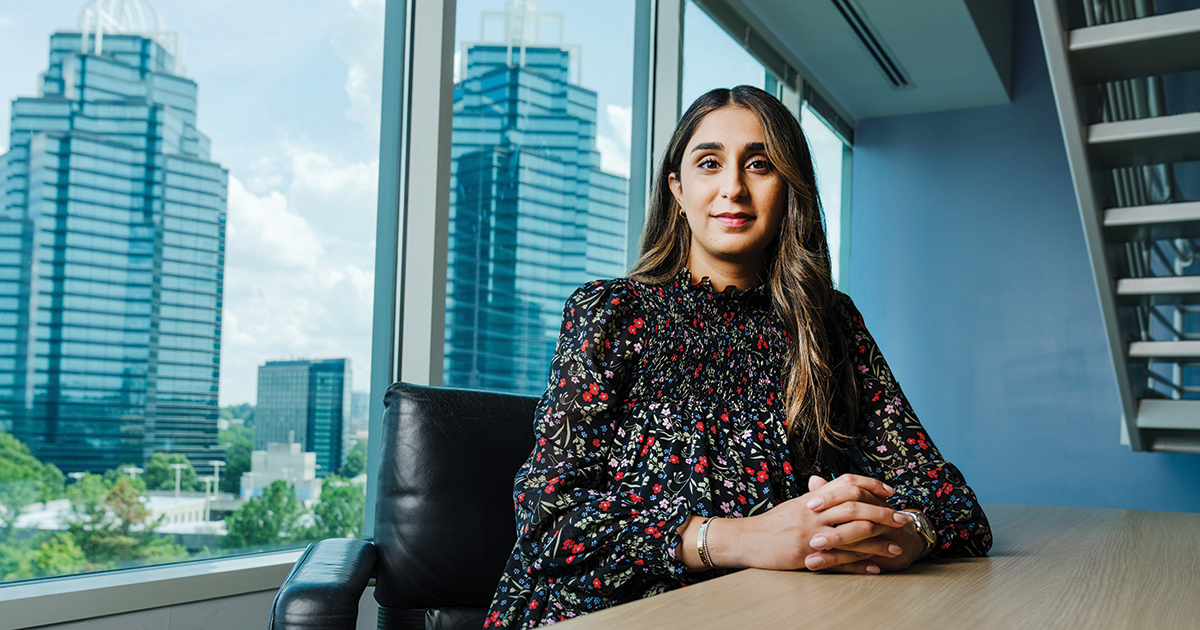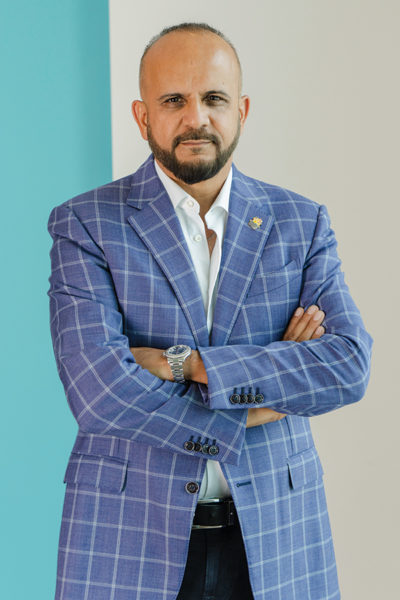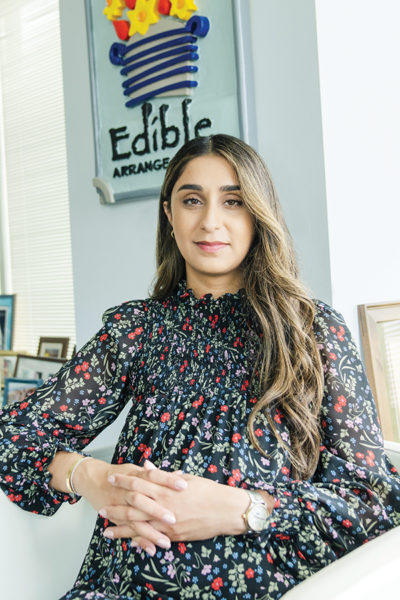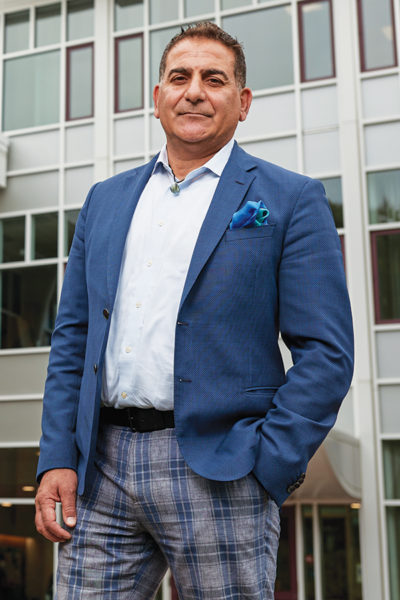The Future of Franchising

$674 billion.
That’s how much money franchising generates every year in the United States. As a way of doing business, it is effective, enduring, and lucrative, and evidence of its success can be seen far and wide. Take a drive just about anywhere, and myriad franchises that are household names dot the landscape.
“We have brands that have been around a long, long time, from the beginning of franchising in this country,” says Ab Igram MBA’96, the executive director of the Tariq Farid Franchise Institute at Babson College. “There is resiliency built into the franchising model for those who do it the right way. It has withstood the test of time.”
READ MORE: Alumni Faces of Franchising
The pandemic provided a daunting test of that resiliency. As the world locked down, the very idea of having a physical location for a franchise began to look unnecessary. Customers became so wary of going indoors that the use of drive-throughs surged, and so-called ghost kitchens, eateries that exist for the sole purpose of fulfilling online orders, began popping up. A large number of franchise locations, across a wide swath of sectors, were forced to shut for long stretches or close altogether. “We didn’t know what the future held in the midst of it,” Igram says.
“There is resiliency built into the franchising model for those who do it the right way. It has withstood the test of time.”
Ab Igram MBA’96, executive director of the Tariq Farid Franchise Institute
In response, franchisees and franchisors embraced technology and got creative. Eateries doubled down on delivery, and health and wellness franchises offered their classes online or outside. Franchise owners also leaned on each other for support and advice, and franchisors provided flexibility, allowing franchisees to delay scheduled (and costly) store improvements.
“You had to be entrepreneurial and adapt,” Igram says. “There was a lot of collaboration and communication. They worked together to weather the storm. The franchise model proved to be more resilient than independently owned businesses with less scale and support.”
Now that the storm is passing, those in franchising look to the future, one marked by new business trends and a new generation of franchise owners. It is a future in which Babson, through the institute that Igram leads, plans to play a major role.
A Need for Education
The Tariq Farid Franchise Institute was launched last year thanks to the generosity of Tariq Farid P’15, the CEO and founder of Edible Brands, and his family. Farid takes an active role in the institute, along with his daughter, Somia Farid Silber ’15, who serves as president of Edible Brands, as well as a trustee at Babson.

of Edible Brands. (Photo by Kevin D. Liles/kevindliles.com)
Focusing on education, research, and experiential learning, the institute resides within Babson’s Arthur M. Blank School for Entrepreneurial Leadership and provides an academic focus on franchising that is typically lacking in higher education. “The whole industry missed out on education,” Farid says. “I started out in a tiny little flower shop with the first Edible store next door when no one taught franchising in school. We’re hoping to change that.”
The entrepreneurial leadership that Babson can impart to the industry is needed. “For any franchisee to be successful, they have to have that entrepreneurial mindset,” Silber says. “It is a key quality we look for in our franchisees. Being adaptable allows them to be successful no matter what new challenges arise in the market and in their business.”
The work of the institute comes as franchising finds its footing after the tumult of the pandemic. Disruptions in the industry have simmered down. “Post-pandemic, it has given everyone the chance to hit the reset button,” Farid says. Online ordering and delivery were critical during the height of COVID-19, for instance, but now customers are flocking back to physical locations, particularly in regard to food. “That physical food location isn’t going anywhere,” Farid says. “Brands are about experience. You need a physical location to have experience.”
Not that everything has returned to the status quo. Changes are afoot, and a new generation of leaders is increasingly remaking how business is done.
A Younger Generation
Edible Arrangements has more than 1,000 locations, and from their prominent vantage point in the industry, Farid and Silber have noticed a variety of trends shaping franchising’s future.

A big one is youth. The owners of franchises are becoming younger. “We are seeing a lot of growth with the millennial age group,” Silber says. “They are data driven. They are interested in using new technology that will help them find operational efficiencies and new revenue opportunities. It is a refreshing time.”
One prime example of this youth movement is Silber herself, who started working full time at Edible a year or so after graduation. “I was in a product manager role working with a team to create a new set of apps,” she says.
Those apps were used by franchisees and store employees to improve back-of-house processes such as employee training and ensuring consistency in product quality. “Technology is the backbone of our business,” Silber says. “It was essential that I started out with this team to learn the inner workings of our processes and how to create franchising-specific tools and applications.”
With their interest in technology, younger franchisees are able to constantly reach out to customers. It’s a long way from the old days of coupons and mailing lists. “I like to think back to the ’90s. I would like to think we were very engaged with the customer,” Farid says. “Now you have a generation that is connected to every customer in real time. And, they are good at it. The engagement is so much better.”
“Although we are a national brand, we are continuing to evolve our stores to be seen as local businesses that are integrated into their communities.”
Somia Farid Silber ’15, president of Edible Brands
Work-life balance and especially sustainability are other concerns of younger franchisees. “There is a strong desire to leave a greater impact and do something that makes a difference,” Silber says. “That is ingrained with this next generation of franchisees.”
Youth also is driving a trend for franchises centered on health and wellness, something that was nonexistent 15 or even 10 years ago. “The next generation of consumers—millennials, Gen Z—are focusing on their health and well-being at an earlier age,” Silber says. “Healthy foods. Healthy lifestyle. They want to take preventative action.”
Something else that customers want is personalization. While they may have returned to physical locations, they aren’t settling for sterile, cookie-cutter experiences. They increasingly expect businesses to reflect their towns and neighborhoods. “There is more focus on shopping local and shopping in your neighborhood,” Silber says. “Although we are a national brand, we are continuing to evolve our stores to be seen as local businesses that are integrated into their communities.”
The Missing Piece
As the franchising industry looks to the future, Igram believes that Babson and the Tariq Farid Franchise Institute are well-positioned to play a prominent role. “Babson has the perfect platform with all we teach in business education and entrepreneurship,” he says. “The opportunity is there.”

Though the institute was launched only last year, it already has awarded research grants for professors, started a student scholarship program, created experiential learning opportunities with companies, and built upon existing franchising content in a graduate class to make it a popular course on the subject. The institute also is weaving franchising expertise into other existing courses and forming a global advisory council of Babson alumni and industry experts who are involved in franchising.
Igram says the institute’s goal is to help students in all facets of the franchising industry, whether they are trying to launch and scale a new venture, operate one—or a slew of—franchise locations, or work in a variety of disciplines, from marketing to finance to supply chain management, within franchise brands. “Our hope is to increase awareness, increase education, and create new opportunities and pathways in the industry,” he says.
Igram believes that Babson’s franchising students are entering an industry full of possibility. Consider the significant amount of investment franchising is attracting, not just with franchisors but also with franchisees who own multiple locations. A few large multi-unit franchise operators have even gone public. “If you had asked me 15 years ago if I thought that would be the case, I wouldn’t have been sure,” Igram says.
READ MORE: The Franchising Journey of President Spinelli
Not only have investors taken companies public, but they also are doing the opposite: taking public companies private to create large multi-brand operating companies and platforms. “You now have private equity funds acquiring and taking companies private and adding brands to create synergies and scale,” he says.
Reflecting on his past experience as a lender to both franchisees and private equity funds acquiring franchisors and franchisees, Igram says, “I have seen firsthand the increased demand and interest in the sector, which bodes well for the future.”
Igram also is inspired by the effect that franchises can have on a community, whether by creating jobs or by addressing sustainability and societal concerns through a socially responsible brand that’s passionate about such issues. “Franchising is a means to scale business and create economic and social value,” Igram says. “You can use franchising to make more of an impact in a community. That can be really, really powerful.”
“Franchising is the best of entrepreneurship. You bring your energy, and we’ll give you something to sell. We build millionaires. We build entrepreneurs. That’s what we do. We are an incubator of entrepreneurs.”
Tariq Farid P’15, CEO and founder of Edible Brands
Franchising is a potent means to grow wealth, and that’s what excites Farid. Unlike a corporate-run chain enterprise, such as Starbucks, companies that franchise give others the chance to share in their success. Own a proven franchise, run it right, and one will do well.
“It’s a great model. Franchising is the best of entrepreneurship,” Farid says. “You bring your energy, and we’ll give you something to sell. We build millionaires. We build entrepreneurs. That’s what we do. We are an incubator of entrepreneurs.”
Babson’s institute will better prepare others to take part in the industry. “I like to think what Babson is doing is the final piece in the franchising ecosystem,” he says. “The last missing piece is this institute.”
Posted in Community, Entrepreneurial Leadership






